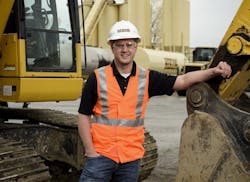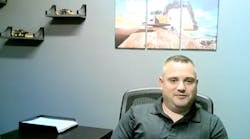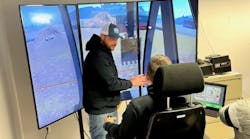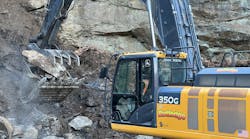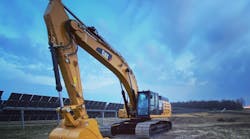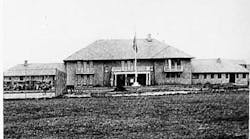Deric Berry is only 30 years old, but he has a calm, steady demeanor that gives you the feeling he’s seen a lot. That’s because he has.
Now the corporate fleet manager for the equipment division of Herzog Contracting, St. Joseph, Mo., Berry got his start eight years ago climbing on heavy iron to install GPS systems.
Our second class of Under 40 in Construction Equipment winners was announced late last year. These young people, all under the age of 40 as of the end of 2014, represent exciting potential for the industry.
This is another in a series of profiles highlighting some of the winners.
Today, he purchases and outfits the company’s light-duty vehicles, manages the fuel card program, establishes rates, and monitors Herzog’s telematics-equipped machines and vehicles through a system he helped design.
“I think one of the toughest things about the job, but also one of the most enjoyable things at times, is the pace that things happen,” Berry says. “Everything is constantly evolving as far as equipment, vehicles, safety, and telematics—it’s ever changing.”
Berry has adapted to the many changes as he’s grown into his job.
“Nothing is given; you’ve got to prove yourself, work your way up, and work your way into things,” he says. “I’m definitely going through that process daily, taking on different roles as I’ve been here.
“We always joke that we should start a fire department, because sometimes it feels like you’re just putting out fires all day. But I love what I do because there’s always something different going on. I don’t feel like I come in and punch in and punch out to do the same thing every day.”
Herzog, a heavy civil roadbuilding, railroad and environmental contractor with operations from Canada down to the Turks and Caicos Islands and from California across to Boston, has approximately 700 to 800 pieces of heavy equipment, 750 trucks, including asphalt and emulsion sprayers, and over 600 pickups.
Rolling responsibilities
For trucks, Berry is Herzog’s go-to guy. “I purchase all the light-duty vehicles, handle the outfitting, whether it be a new service body or hyrail gear, evaluate the fleet, decide when it’s time to replace it, and equip it accordingly,” Berry says.
Berry also approves all the truck maintenance. “We’ve set up GM FleetTrac, we’re buying GM vehicles now, so all those invoices are consolidated and we get a monthly bill, and I review that. I don’t handle the day-to-day oil changes, but if something does have a breakdown they need help getting warranty coverage on, I make it happen,” he says.
Safety measures
Two big changes in the vehicle program during Berry’s tenure involve safety, an ongoing priority for the company.
“We take a lot of pride in our vehicles, we don’t buy work truck packages for our employees—[all the amenities] are electric, we try to give them the greatest safety possibilities that manufacturers have available,” Berry says.
“In 2008, we started putting in back-up sensors and now we’ve gone to the actual back-up cameras on everything to try to prevent any incidents we can. Everything is focused on helping the guys be safer out there on the job and make it home safely,” he says.
Berry also established Herzog’s first Fleet Safety Guide (FSG). It started as a small, handy brochure sized to fit in gloveboxes, consolidating and listing the company’s vehicle policies and related contact information. Today, it’s an integral part of Herzog’s employee handbook.
“Through the FSG, we came up with a plan to help our operators be more aware of situations and understand Herzog’s standards for operating their vehicles,” Berry says.
“When we did it, we implemented industry best practices to help driver awareness, as well as some of the tools they needed, such as the back-up sensors,” he says. “Herzog is also so spread out at times that it’s difficult getting everyone together to use the same guidelines for operating vehicles.”
Berry points out that the Herzog culture of embracing innovation has helped his on-road fleet. “Herzog is very innovative as far as trying something new, such as outfitting a truck differently to try to make things easier for the guys out in the field. We’re willing to take that chance,” he says.
“We were one of the first companies to take a high-roll truck. When the DOT got aggressive on FMCSA back in 2010, we started re-evaluating some of our trucks and felt they could possibly be overweight when fully equipped,” Berry explains. “To better suit them, we worked with Fleet Body, which is now AutoTruck, to design a system going from a dual-rear-wheel truck to a super single-rear-wheel to work better with the on-road application that goes with the gear and the body.”
Telematics and the Iron Portal
Berry, and Herzog, were early adopters of telematics technology.
“I was initially hired to work on installing the telematics systems of the time,” Berry says. “Just a couple of days after I started, I was traveling from job site to job site doing installs. My first duty was to outfit the entire fleet of construction equipment with telematics.”
Berry had some experience with GPS units in a prior position with another contractor that served him well once he was immersed in the installs at Herzog.
“It was very early for the industry, Herzog was with Qualcomm at that time, and there weren’t a lot of people using telematics then,” Berry says. That was April 2008. Today the company has roughly 800 telematics devices installed.
“At first, they were all aftermarket GPS systems and we would put a box on top of the Komtrax box, or basically any factory box the machine came with, so we didn’t have to jump from website to website to monitor those systems,” Berry says.
It was important to Herzog Contracting to have the assets visible on a single website. “When our VP of equipment for corporate assets began working on the AEMP telematics standards, that’s when we started looking at something like the Iron Portal, so that everything would flow together,” Berry says.
Iron Portal is Herzog’s customized fleet-tracking system designed to its own specs in cooperation with telematics vendor Iron Portal, Inc.—and with a whole lot of hands-on time and coordination from Berry.
“We went with Webtech when we started doing installs in all of our vehicles at that time. It was somewhat difficult, even though it was easier to keep the vehicles and the equipment separate, to manage everything together,” Berry says. “It was really beneficial to have it all on one website, and that’s what Iron Portal is.
“Iron Portal brings everything with telematics into one website, so you can have a mixed fleet; you don’t have to have all John Deere with John Deere boxes, and the same with Cat and Komatsu,” Berry says.
“We also wanted a solution that tracked all assets. We don’t have GPS on many trailers right now or on other small assets, so in order to track everything we actually had it designed so we can add non-telematic devices and assign them to jobs appropriately just to keep track of them. This beats having 15 different spread sheets from 15 different jobs and then trying to consolidate it all into one place. It’s all right there.”
“Right there” is a 65-inch flat screen on Berry’s office wall, controlled by a mouse on his desktop. He can look up from his desk and track the location of each piece, track the hours for appropriate billing, and check utilization. Berry also uses the system to schedule maintenance.
“You can set up any type of time schedule for PMs, whether it’s hours, miles, or just a date such as an annual DOT inspection, and alerts from the system will pop up and let you know it’s time,” he says.
Though it sounds like a fleet manager’s dream, the development of Iron Portal was arduous. There was extensive back-and-forth with the vendors. “We didn’t do the software, it is on our server, but as far as the system’s design and what we wanted to see, the specs are ours.
“We had to tell them what we wanted and what we felt was beneficial to us. It was a long process, there were a lot of calls, and a lot of conversations about what we wanted, when we wanted it, and how it was going to update. There was oversight on our side as far as the fields we wanted to see. Something as simple as make, model and VIN without some of the other information there wouldn’t serve a purpose,” Berry says.
Iron Portal has been up and running for about a year and has already paid big dividends, according to Berry. He warns people not to get too hung up on costs.
“One of the first things that comes up is how much it costs, and I know there have been times here in-house that we’ve looked at what we’ve paid for hardware and what we pay monthly, but then you look at the one backhoe that was stolen and you recovered.
“Automatically, right there, you balance those two costs and it’s a no-brainer that telematics pays for itself,” he says.
It was the mere tracking capability and not an instance of the equipment being outside of a geofence that led to the recovery. “Telematics helped in finding the location,” Berry says. “It wasn’t too far away, but it was hidden back in some bushes and we couldn’t find it. But by looking at the telematics, we knew it was still right there and were able to figure out where it was.”
Berry touts the information the system is relaying, as well. “Telematics is getting smarter. We’ve got guys that when an engine code pops up, they’re not sure what it means. If they get that ‘check engine,’ they call us, and we can pull the code up and tell them what it is. That’s important, because we can advise them if they need to pull over immediately for a tow, or if they can drive themselves to a local dealer to have it handled,” he says.
“Telematics can be scary. You need to figure out exactly what you want to accomplish with the telematics system you’re going to use. Some are basic and some are very complex. It depends on how much you want to get out of it. I think it’s a no-brainer to go with telematics,” Berry says.
“Depending on how smart the system is, you can also see how much your operator is allowing a machine to idle; this can save money on the job and for the company.”
He says tracking idling is the next frontier for Herzog—and no doubt one of many for Berry.
